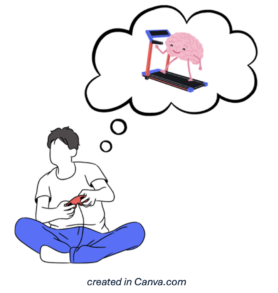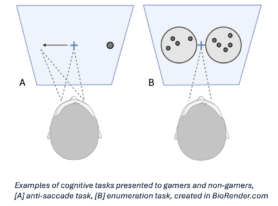Uncategorized
Gaming for Gains: Surprising Cognitive Benefits of Video Games
by Mirjam Stelzer – Mai, 2025
Video Games could be the evening brain workout you never knew you needed

In an era dominated by fitness influencers and the quest for physical well-being, we all know that regular exercise is essential for maintaining a healthy body. What if there was a way to not only unwind after a long day at work but also give your brain an extra workout? Enter the world of video games. Researchers from the University of Tübingen have discovered that regular gamers outperform non-gamers in various cognitive tasks.
Brain and body exercise
Countless studies in recent years were conducted to find out more about how playing video games can impact our mental health. However, gaming has increasingly been suggested to improve cognitive abilities. We’re talking about sharper short-term memory, better numerical estimation (the ability to approximate numbers), and faster processing speeds.
Prof. Dr. Uwe Ilg, head of the Pupils Lab of Neuroscience and member of the Hertie Institute for Clinical Brain Research in Tübingen, Germany, has worked with the impact of gaming on the brain for several years. He explains how his team tested gamers and non-gamers for reaction speed and executive control, differentiating between quick and deliberate reactions:
“If you imagine that you are in a completely dark room and a light comes on. Naturally you would look there. This is called a ‘visual grasp reflex’. In the laboratory we tell the participants not to look to the light source, but to look the other way. So when the light switches on on the left, you have to look to the right. We call these eye-movements ‘anti-saccades’.”
Their research revealed that gamers show an increased reaction speed, without sacrificing accuracy.
Their data clearly shows that gamers actually have shorter reaction times. They are able to react faster, but they don’t make more mistakes and can control themselves just as well, he adds.
His team also tested the participants for numerical sense, the intuitive ability to perceive and distinguish between numbers, including the ability to recognise and determine changes in quantities. They found that regular gamers were more precise in their estimation of numbers than non-gamers.

But how can we make sure that while working out our brains, we don’t forget to move our bodies to also keep them healthy? Terms like ‘exergame’ and ‘gamercise’ have been around for some years and have challenged the stereotype of the gaming ‘couch potato.’
There’s a whole realm of games designed to get you off the couch and into the action. Take, for instance, Just Dance!, a game that turns your living room into a dance floor. For those who prefer a more sporty challenge, games like Wii Sports offer virtual versions of tennis, bowling, boxing, and more.
Additionally, video games are increasingly used to treat medical conditions like infantile cerebral palsy or as tools for early detection of dementia. One of these projects, The Mind Guardian, a collaboration between a team of Spanish researchers and the South Korean corporation Samsung, launched its application just this March (11.03.25). The app is meant as a screening tool for possible cognitive impairment. It combines three different artificial intelligence techniques and various games that the users play to get analyzed.
Gaming can be a productive pastime
So, if you thought gaming was all about sitting still and staring at a screen, think again. The future of gaming is active, immersive, and incredibly fun. And the next time you pick up that controller, remember that you might be giving your brain the workout it needs to stay sharp and healthy!
References
Mack, D. J., & Ilg, U. J. (2014). The effects of video game play on the characteristics of saccadic eye movements. Vision Research, 102, 26-32.
Stäb, J., & Ilg, U. J. (2021). Video‐game play and non‐symbolic numerical comparison. Addiction Biology, 26(6), e13065.
Wild, C. J., Paleczny, S. G., Xue, A., Highfield, R., & Owen, A. M. (2024). Characterizing the Cognitive and Mental Health Benefits of Exercise and Video Game Playing: The Brain and Body Study. PsyArXiv.
Macchi, F., Macchi, F., & Macchi, F. (2025, March 11). Scientists develop early detection video game for Alzheimer’s and dementia symptoms. EL PAÍS English. https://english.elpais.com/health/2025-03-11/scientists-develop-early-detection-video-game-for-alzheimers-and-dementia-symptoms.html
You must be logged in to post a comment.

